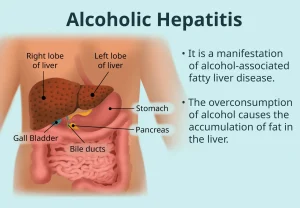Overview
Diagnosis of Alcoholic Hepatitis
Diagnosing alcoholic hepatitis starts with a physical exam and an honest discussion about alcohol consumption. Healthcare providers may also speak with family members to get a clearer picture of drinking habits.
Liver Enzymes and Liver Function Tests (LFTs)
Blood tests are essential to evaluate liver inflammation and damage. Typical findings in alcoholic hepatitis may include:
-
Aspartate aminotransferase (AST) and alanine aminotransferase (ALT): AST/ALT ratio often greater than 2:1, suggesting alcohol-related liver injury.
-
Total bilirubin: Elevated levels can cause jaundice (yellowing of skin and eyes).
-
International normalized ratio (INR) / Prothrombin time (PT): High levels indicate reduced clotting protein production, increasing bleeding risk.
-
Albumin: Low levels signal poor liver function and possible malnutrition.
-
Gamma-glutamyltransferase (GGT): Often elevated in alcohol-related liver disease.
These tests guide diagnosis but are not definitive on their own; they are interpreted alongside symptoms and alcohol history.
Other Blood Tests
Additional blood tests may help rule out conditions that mimic alcoholic hepatitis, including:
-
Viral hepatitis (A, B, or C)
-
Autoimmune liver disease
-
Genetic or metabolic disorders such as Wilson’s disease or alpha-1 antitrypsin deficiency
-
Iron studies
Imaging Tests
Ultrasound, CT scan, or MRI can detect:
-
Liver size and fat buildup
-
Scarring or fibrosis
-
Bile duct problems or liver tumors
Liver Biopsy
A liver biopsy may be necessary if other tests are inconclusive. A small tissue sample is examined under a microscope to confirm inflammation and rule out other conditions.
Treatment of Alcoholic Hepatitis
Effective treatment focuses on stopping alcohol consumption and supporting liver recovery.
Quitting Alcohol
-
Complete alcohol abstinence is crucial for recovery.
-
Mild to moderate cases may improve within weeks if drinking stops.
-
In severe cases, stopping alcohol remains vital, though damage may be irreversible.
-
Professional support is recommended to prevent withdrawal complications.
Support options include:
-
Medications
-
Counseling or therapy
-
Alcoholics Anonymous (AA) or other support groups
-
Structured treatment programs
Nutrition Management
Malnutrition is common in alcoholic hepatitis. Treatment may involve:
-
Special diet plans tailored by a dietitian
-
Feeding tube support in severe cases to provide essential nutrients
Medications to Reduce Liver Inflammation
-
Corticosteroids: Can improve survival in severe cases, but may have serious side effects.
-
N-acetylcysteine: Experimental therapy; more research is needed.
Liver Transplant
For advanced alcoholic hepatitis, a liver transplant may be life-saving. Modern studies show carefully selected patients achieve survival rates comparable to other liver diseases.
Prognosis and Duration
-
Mild to moderate alcoholic hepatitis: Symptoms can improve in weeks to months with alcohol cessation. Liver function may return to near normal.
-
Severe alcoholic hepatitis: May cause long-term liver damage and ongoing complications, such as fluid retention or confusion. Only a small percentage recover fully without complications.
Advertisement

